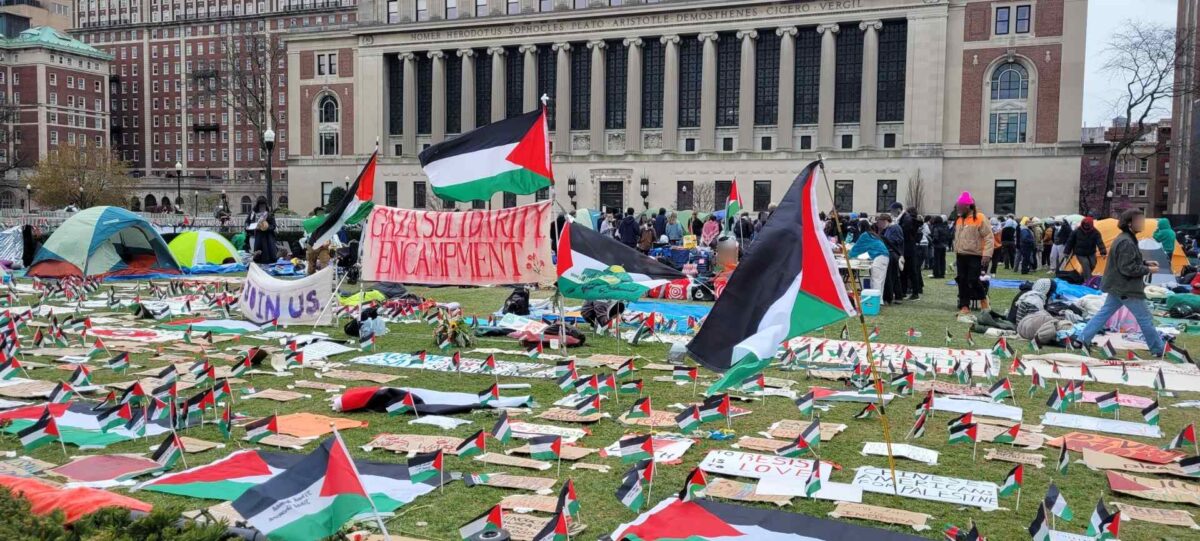About two weeks after October 7, I had a strong feeling that the movement in solidarity with Palestine was looking a lot like the youth uprising in the 1960’s. Today after the police assault on the students at Columbia and across the country, there is no doubt. I guess after 56 years, the powers that be have forgotten the lessons.
I moved to New York and got a job working in a disability centre at Columbia University in the fall of 1968. The massive student protests where 700 students were arrested and beaten by New York City police took place on April 30. By the time I got there in October, there had been a profound radicalization. The Students for a Democratic Society (SDS) meeting that I attended out of curiosity broke up in a fist fight because some of the leaders were forming the Weathermen, later called the Weather Underground, a radical group that believed in violent direct action to promote a revolution in the United States.
I think protesters have learned more than university presidents since then, but there is no doubt that this student/youth movement supporting the liberation of Palestine will grow and become more determined because of the repression. Another difference this time is the support of the faculty for the students. Except for a couple of professors, this wasn’t true in the sixties.
Only 200 students were arrested at Columbia and the police were much more sophisticated in hiding their violence from the media who were kept at distance where they couldn’t see. Just the fact that CNN and CBC among others covered the police assault live on their prime news programmes illustrates the impact that this youth uprising is having. I have little doubt that if President Biden continues to arm genocidal Israel, he will lose the next election. The catastrophe of a Trump election during a time of youth radicalization is almost impossible to imagine.
As one of the young people involved in the anti-war movement in the 1960’s, I can testify without question that involvement in this kind of movement is deeply affecting and that many of these students will go on to challenge the system that punishes young people for protesting the mass murder of children, the demolition of universities and hospitals and the investment of their institution in a genocidal war.
It is happening in Canada too. McGill called the police onto campus to remove an encampment there. In addition, two McGill students brought an application to the Superior Court of Quebec seeking an injunction to remove the encampment saying the protestors make them “feel unsafe.” Fortunately, a judge rejected the injunction. The whole point of protest is to make people uncomfortable so that they will change their views. No doubt, the argument here as elsewhere will be antisemitism. But many of the protesters are themselves Jewish both at Columbia and at McGill. And there is very little antisemitism in the pro-Palestinian movement.
I was at McGill in the late 60’s and participated not only in the anti-war movement but the student newspaper. The editor of the McGill Daily was fired by the right-wing student council in 1967-68 for publishing an article about an engineering professor doing research for the US army. Students rallied and we got back control of the newspaper within a few weeks.
Police were very aggressive in Toronto anti-war marches. They would dive into demonstrations at the US Consulate with their horses, beating protesters. But in the anti-war movement, there were protesters fighting each other too. In the current movement, there is little violence in the movement itself. Here in Toronto, I’ve been on almost all of the weekly marches and seen no violence at all. Even for the G20, where Toronto police arrested 1,100 innocent people, there were a handful of activists breaking windows on Yonge St. This movement so far is completely peaceful. So why the aggression from authorities? They say it’s antisemitism but that’s a lie.
As a public Jew in Canada for the last 30 years, I have experienced antisemitism, especially during the pro-choice struggle when Dr. Henry Morgentaler and I were the most visible spokespeople of the movement. The pro-Palestinian movement is not antisemitic. It is anti-Zionist. Zionism is a political philosophy that underlies the foundation of the state of Israel. Criticism of Zionism and/or Israel is not antisemitism. Unfortunately, many Jewish students are told by their community that it is and that’s what’s making them feel unsafe, not the actions of the protesters. Debate and discussion of the issues involved is what we need, not cops arresting peaceful protesters.
But underneath the false claims of antisemitism is another deeper reason that authorities fear the youth uprising. It is being led by young people in the Palestinian diaspora around the world. The Palestinian Youth Movement is an international grassroots movement that is better organized than any such group I have seen. What will happen to a world where imperialist powers can no longer claim to be the guardians of democracy when the victims of their violence and their children live everywhere in their countries ready to tell the truth about the oppression and violence in their countries of origin.
I have no question that this recent youth uprising will be as transformative as was the youth uprising of my generation.




